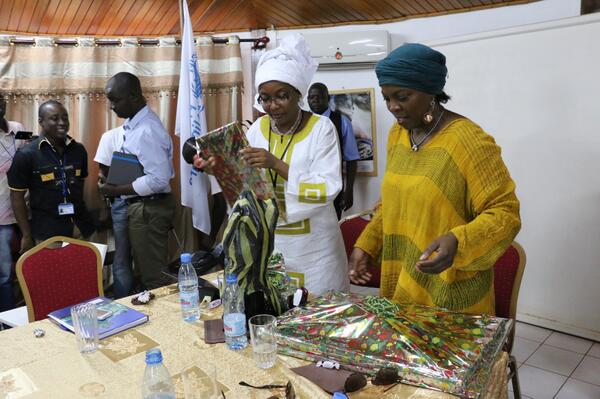@WFP executive director meets #CAR local and international staff on her first visit to #Centrafrique - photo: pic.twitter.com/4GIZYPCGkY
--
BANGUI – United Nations World Food Programme (WFP) Executive Director Ertharin Cousin today witnessed alarming food insecurity and malnutrition in Central African Republic (CAR) amid a deadly combination of violence and insufficient funding for the humanitarian response.
“Today I heard harrowing stories from ordinary women and children of losing their families in the violence and traumatic attacks that forced them to flee,” Cousin said after a visit to the northwestern town of Bossangoa. “I am humbled by their strength in these desperate times. We simply cannot deny them the assistance they need, especially after all they have endured.”
“The entire population, not only the displaced, is affected and live in a precarious food situation. The people of CAR particularly women and children need us now. We must act before the rains exacerbate the tragic situation,” she said. “We must not wait until pictures of skeletal, severely underweight, children document our failure and neglect.”
Cousin took part in a joint seeds and food distribution programme, with the UN Food and Agriculture Organization. “If we miss the planting season, starting in April, the families will have no harvests because they have run out of food. We must provide food, so that families are not forced to eat the seeds to survive.”
“Donors are providing help to millions of Syrians entering a fourth year of conflict. Then, there are rising demands in South Sudan,” Cousin said. “But we simply cannot tell a child in Bossangoa that we can’t help because she isn’t as important as a child anywhere else.”
So far this year, despite immense logistical and security challenges, WFP has provided food to more than 250,000 people per month in CAR, including specialized nutritious foods to help prevent malnutrition among children.
But the scale of the disaster requires deeper engagement from the international community. In the coming weeks most roads will become impassable with the rainy season. The rains will also increase the risk of diarrhoea and illness for tens of thousands of displaced people in unsanitary, makeshift camps.
“We must make sure this largely forgotten crisis doesn’t become a neglected tragedy,” Cousin said.
With only 35 percent of funding secured for its CAR emergency operation through August, WFP has been unable to pre-position stocks required for life-saving assistance during the rains and the annual lean season when food from the last harvest runs out.
Insecurity along the road corridor from Cameroon to Bangui forced WFP to airlift 1,800 metric tons of rice. With the escort of the African-led peace-keeping mission, MISCA, the flow of food supplies by road has resumed but may be interrupted should security deteriorate.
“Security is the major concern. The international community must step up to help the government of CAR end violence. Humanitarian access is a priority,” said Cousin.
The disaster in CAR has hugely impacted neighbouring countries. More than 290,000 people have fled the country into Chad, the Democratic Republic of Congo (DRC), Cameroon and the Republic of Congo. WFP and other humanitarian agencies are short of funds and food assistance may be disrupted in Chad and in DRC if new contributions are not received.
# # #
WFP is the world's largest humanitarian agency fighting hunger worldwide. Each year, on average, WFP feeds more than 90 million people in more than 70 countries.
Follow us on Twitter @wfp_media and @wfp_WAfrica

No comments:
Post a Comment